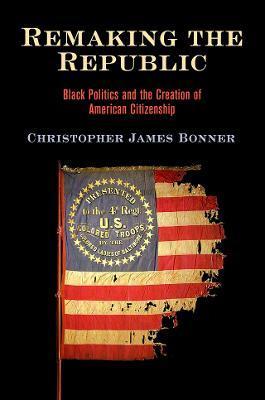Remaking the Republic: Black Politics and the Creation of American Citizenship

Remaking the Republic: Black Politics and the Creation of American Citizenship
Citizenship in the nineteenth-century United States was an ever-moving target. The Constitution did not specify its exact meaning, leaving lawmakers and other Americans to struggle over the fundamental questions of who could be a citizen, how a person attained the status, and the particular privileges citizenship afforded. Indeed, as late as 1862, U.S. Attorney General Edward Bates observed that citizenship was "now as little understood in its details and elements, and the question as open to argument and speculative criticism as it was at the founding of the Government."
Black people suffered under this ambiguity, but also seized on it in efforts to transform their nominal freedom. By claiming that they were citizens in their demands for specific rights, they were, Christopher James Bonner argues, at the center of creating the very meaning of American citizenship. In the decades before and after Bates's lament, free African Americans used newspapers, public gatherings, and conventions to make arguments about who could be a citizen, the protections citizenship entailed, and the obligations it imposed. They thus played a vital role in the long, fraught process of determining who belonged in the nation and the terms of that belonging. Remaking the Republic chronicles the various ways African Americans from a wide range of social positions throughout the North attempted to give meaning to American citizenship over the course of the nineteenth century. Examining newpsapers, state and national conventions, public protest meetings, legal cases, and fugitive slave rescues, Bonner uncovers a spirited debate about rights and belonging among African Americans, the stakes of which could determine their place in U.S. society and shape the terms of citizenship for all Americans.PRP: 193.36 Lei
Acesta este Prețul Recomandat de Producător. Prețul de vânzare al produsului este afișat mai jos.
174.02Lei
174.02Lei
193.36 LeiLivrare in 2-4 saptamani
Descrierea produsului
Citizenship in the nineteenth-century United States was an ever-moving target. The Constitution did not specify its exact meaning, leaving lawmakers and other Americans to struggle over the fundamental questions of who could be a citizen, how a person attained the status, and the particular privileges citizenship afforded. Indeed, as late as 1862, U.S. Attorney General Edward Bates observed that citizenship was "now as little understood in its details and elements, and the question as open to argument and speculative criticism as it was at the founding of the Government."
Black people suffered under this ambiguity, but also seized on it in efforts to transform their nominal freedom. By claiming that they were citizens in their demands for specific rights, they were, Christopher James Bonner argues, at the center of creating the very meaning of American citizenship. In the decades before and after Bates's lament, free African Americans used newspapers, public gatherings, and conventions to make arguments about who could be a citizen, the protections citizenship entailed, and the obligations it imposed. They thus played a vital role in the long, fraught process of determining who belonged in the nation and the terms of that belonging. Remaking the Republic chronicles the various ways African Americans from a wide range of social positions throughout the North attempted to give meaning to American citizenship over the course of the nineteenth century. Examining newpsapers, state and national conventions, public protest meetings, legal cases, and fugitive slave rescues, Bonner uncovers a spirited debate about rights and belonging among African Americans, the stakes of which could determine their place in U.S. society and shape the terms of citizenship for all Americans.










